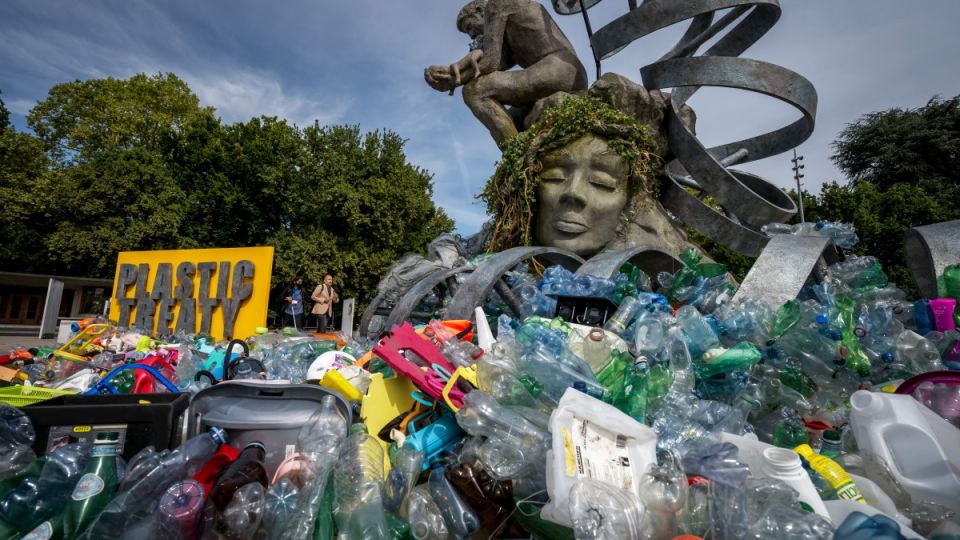August 14, 2025
JAKARTA – Environmentalists have been pressing Indonesia and other Southeast Asian nations to push for strong terms in a global agreement to eradicate the global scourge of plastic pollution, warning of the dire environmental and health impacts from plastic waste in the future.
Delegates and other stakeholders from 184 countries, including Indonesia, have been gathering in Geneva, Switzerland since Aug. 5 in a session of the United Nations Environment Programme’s (UNEP) Intergovernmental Negotiating Committee (INC) to develop an internationally legally binding treaty that would dictate how countries should work to tackle global plastic pollution.
The meeting marks the INC’s final series of negotiations on the treaty, which has been ongoing since mid-2022.
With the meeting nearing its final day, slated on Thursday, environmental activists from Indonesia, Vietnam, Malaysia, Thailand and the Philippines have been calling on their countries’ governments to make haste and reach an agreement that would prioritize the safety of future generations against the plastic pollution crisis.
“We urge delegates to remember the mandate: To end plastic pollution and protect human health and the environment throughout the full life cycle of plastics,” said Yuyun Ismawati, senior advisor of environment health advocacy group Nexus3 Foundation, in a statement on Tuesday.
Yuyun and other campaigners warned that Thursday would be “a point of no return” in the global effort to end plastic pollution.
“Limiting plastic production, controlling toxic chemicals and reducing subsidies for plastic producers are the only ways to meet this goal,” she added.
Read also: Talks for landmark plastic pollution treaty grind on
Plastic pollution has become pervasive across the globe, with its smaller particles, or microplastics, being found all across marine environments and within the human body through ingestion.
The global level of microplastic is predicted to surge more than 50 percent by 2040, as suggested by a study published in 2024 by the American Chemical Society (ACS). The study also found that Indonesians ingested around 15 grams of microplastic per month, the highest among surveyed countries.
Splintered negotiations
Despite the grim projection, negotiations in Geneva have stalled and failed to produce a clear text, with countries still deeply divided on certain purposes and scopes of the treaty’s draft, AFP reported.
A cluster of mostly oil-producing states, such as Saudi Arabia, Russia and Malaysia, want the treaty to focus primarily on waste management.
This group faced a growing faction of the “high-ambition” coalition, comprising the European Union as well as many African, Latin American and small island countries, that want more fundamental action written into the agreement, including reining in plastic production and phasing out several toxic chemicals.
The Environment Ministry’s senior advisor Erik Teguh Primiantoro, who heads the country’s delegation in the Geneva negotiations, previously said that Indonesia would not support restricting plastic production.
The restriction, according to him, would betray the current National Medium-Term Development Plan (RPJMN), which prioritizes the plastics industry to boost investment.
“Our stance cannot possibly contradict the RPJMN,” Erik said, as quoted by Kompas.
Erik was not immediately available to respond to The Jakarta Post’s request for further comments.
Yuyun, who is also a member of steering committee of the Alliance or Zero Waste Indonesia (AZWI), regretted the position taken by Indonesia, despite the country’s history of “championing reasonable consumption and production programs” under the Sustainable Development Goals (SDGs).
She also highlighted the Indonesian delegation’s position in the negotiation for continuously stressing low plastic consumption in the country as a good thing, despite studies showing that Indonesia stands among the highest microplastic “consumers”.
“Indonesia wants to be in the middle,” Yuyun said, “but does not necessarily want to contribute to finding the middle-ground.”
‘Crossroads’
The environmentalists’ joint statement noted how hundreds of representatives of the fossil fuel industry have been heavily lobbying in the negotiations to secure a “weak treaty” focusing only on waste management.
Xuan Quach of the Pacific Environment urged the Southeast Asian negotiators to be empathetic and not trade away the region’s environment for “short-term economic gain” from petrochemical and plastics industries.
“Think about our future generations, the impact of climate change on vulnerable groups and the urgent need for sustainable production and consumption,” Quach said.
Read also: Indonesia urged to step up in plastic treaty negotiations
Southeast Asia currently “stands at a crossroads”, said Punyathorn Jeungsmarn of the Environmental Justice Foundation (EJF), noting the region’s potential but “low ambition” in handling better plastic production and consumption.
“The plastics treaty must set a target for reducing plastic production,” Punyathorn said, “or risk becoming a false solutions treaty.”


